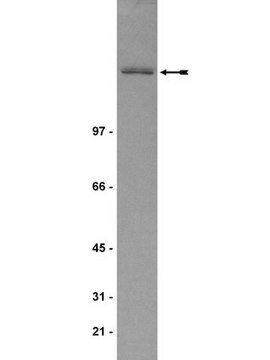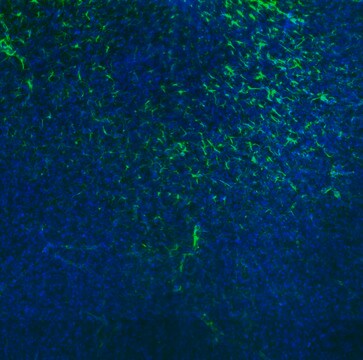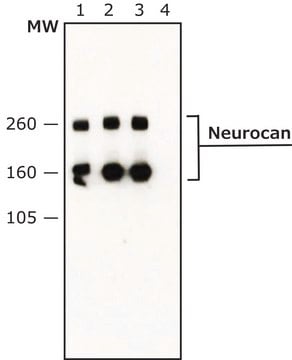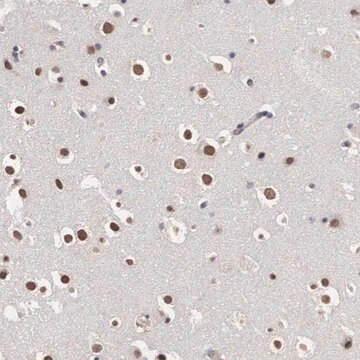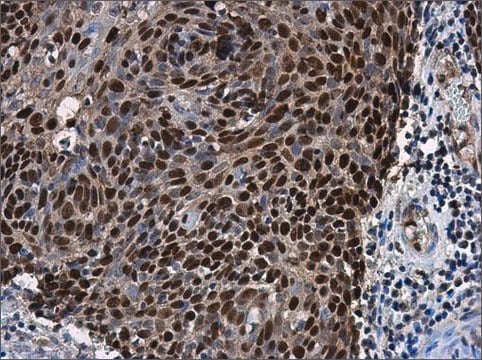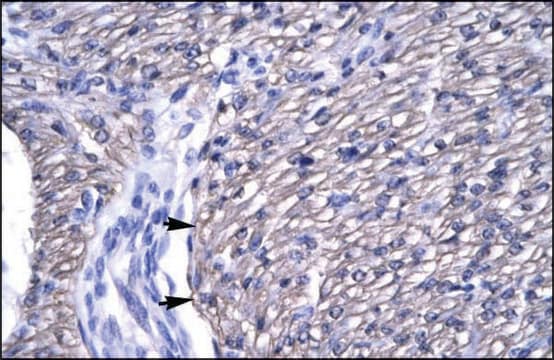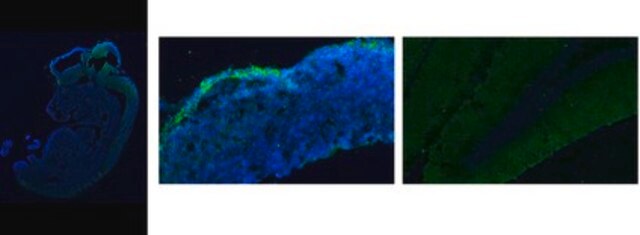推荐产品
生物源
rabbit
品質等級
抗體表格
unpurified
抗體產品種類
primary antibodies
無性繁殖
polyclonal
物種活性
rat, mouse
包裝
antibody small pack of 25 μL
技術
immunofluorescence: suitable
immunohistochemistry: suitable
radioimmunoassay: suitable
同型
IgG
UniProt登錄號
運輸包裝
ambient
目標翻譯後修改
unmodified
基因資訊
rat ... Ncan(58982)
一般說明
Neurocan core protein (UniProt: P55067; also known as 245 kDa early postnatal core glycoprotein, Chondroitin sulfate proteoglycan 3) is encoded by the Ncan (also known as Cspg3) gene in rat. Neurocan is a secreted protein of the aggrecan/versican proteoglycan family that is found in early postnatal and adult brain. During early postnatal development neurocan accounts for at least 20% of the protein of the soluble brain proteoglycans. Neurocan mostly contains chondroitin sulfate, but also has N-linked and O-linked oligosaccharides. It is shown to be involved in the modulation of cell adhesion and migration and regulates neurite outgrowth. Neurocan interact with several cell surface molecules, such as N-CAM, L1/Ng-CAM, etc., and modulates the cell-binding and neurite outgrowth promoting activates of these molecules. Neurocan is synthesized with a 22 aa signal peptide that is subsequently cleaved to produce the mature form. Neurocan contains one C-type lectin domain, two EGF-like domains, one Ig-like V type domain, two link domains and one Sushi (CCP/SCR) domain. (Ref.: Rauch, U., et al. (2001) Cell Mol. Life Sci. 58(12-13):1842-56; Zhou, XH et al. (2001). Mol. Cell Biol. 21(17): 5970-78).
特異性
This rabbit polyclonal antibody detects Neurocan in fetal and adult rat brain.
免疫原
Epitope: C-terminus
GST-tagged recombinant fragment corresponding to 212 amino acids from the C-terminal half of rat Neurocan core protein.
應用
Anti-Neurocan, C-terminal, Cat. No. ABT1347, is a rabbit polyclonal antibody that detects Neurocan core protein and has been tested for use in Immunofluorescence, Immunohistochemistry, and Radioimmunoassay.
Radioimmunoassay Analysis: A representative lot detected Neurocan in rat brain (Milev, P., et. al. (1998). Biochem Biophys Res Commun. 247(2):207-12).
Immunohistochemistry Analysis: A representative lot detected Neurocan in E13 and E14 mouse ventral diencephalon and retina in C57 mouse embryos (Leung, K.M., et. al. (2004). Brain Res Dev Brain Res. 152(1):1-10).
Immunohistochemistry Analysis: A representative lot detected Neurocan in E13 and E14 mouse ventral diencephalon and retina in C57 mouse embryos (Leung, K.M., et. al. (2004). Brain Res Dev Brain Res. 152(1):1-10).
Research Category
Cell Structure
Cell Structure
品質
Evaluated by Immunofluorescence in E14 rat embryo, E14 rat neocortex, and adult rat brain hippocampus cells.
Immunofluorescence Analysis: A 1:500 dilution of this antibody detected Neurocan in E14 rat embryo, E14 rat neocortex, and adult rat brain hippocampus cells.
Immunofluorescence Analysis: A 1:500 dilution of this antibody detected Neurocan in E14 rat embryo, E14 rat neocortex, and adult rat brain hippocampus cells.
標靶描述
135.55 kDa calculated.
外觀
Unpurified
Format: Unpurified
Rabbit polyclonal antiserum with 0.02% sodium azide.
儲存和穩定性
Stable for 1 year at -20°C from date of receipt.
Handling Recommendations: Upon receipt and prior to removing the cap, centrifuge the vial and gently mix the solution. Aliquot into microcentrifuge tubes and store at -20°C. Avoid repeated freeze/thaw cycles, which may damage IgG and affect product performance.
Handling Recommendations: Upon receipt and prior to removing the cap, centrifuge the vial and gently mix the solution. Aliquot into microcentrifuge tubes and store at -20°C. Avoid repeated freeze/thaw cycles, which may damage IgG and affect product performance.
其他說明
Concentration: Please refer to lot specific datasheet.
免責聲明
Unless otherwise stated in our catalog or other company documentation accompanying the product(s), our products are intended for research use only and are not to be used for any other purpose, which includes but is not limited to, unauthorized commercial uses, in vitro diagnostic uses, ex vivo or in vivo therapeutic uses or any type of consumption or application to humans or animals.
未找到合适的产品?
试试我们的产品选型工具.
儲存類別代碼
12 - Non Combustible Liquids
水污染物質分類(WGK)
WGK 1
閃點(°F)
Not applicable
閃點(°C)
Not applicable
我们的科学家团队拥有各种研究领域经验,包括生命科学、材料科学、化学合成、色谱、分析及许多其他领域.
联系技术服务部门
